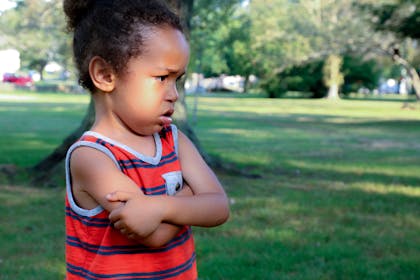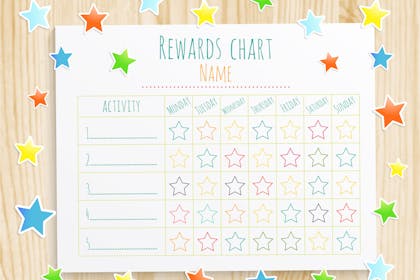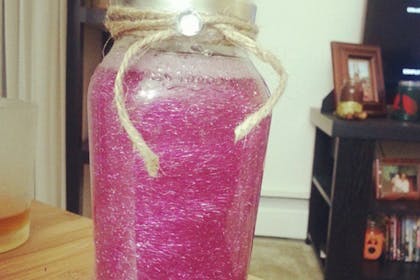13 ways to deal with toddler tantrums
Tantrums can be tough to deal with – especially in public when you feel like all eyes are on you and your child. Check out our top tips for dealing with toddler tantrums.
Almost all kids have tantrums at one time or another, but knowing that doesn't make it any easier to deal with when they're rolling around screaming on the supermarket floor.
Tantrums can make taking your kids out with you very stressful if you're anticipating an incident every time.
Having a few tricks up your sleeve and a little bit of added insight will really help to make a difference. So take a look at our ideas and try a few with your little one when they decide it's time to test your limits!
1. Explain to your child that you understand how they feel

It's tough being a toddler. They don't always understand how they're feeling, and struggle to express themselves.
Emotions are complicated at such a tender age, and it can be difficult to control a child who feels out of control themselves!
But talking always helps – let your little one know that you understand why they are cross and they'll know that you're on their side.
For example, you can say:
– "I know you can put your shoes on by yourself but the straps are so fiddly, aren't they? Do you want me to help?"
– "I know you're having such fun and feel sad because you don't want to go, shall we come back again tomorrow?
– "I know! Why don't we stop at the shops on the way home and buy some strawberries to celebrate you being such a great helper today?"
2. Be aware of common tantrum triggers

Toddlers are more likely to get cross when they're tired or hungry. Let's face it – nobody's at their best when they're 'hangry'!
You can prepare for a successful trip out by making sure that your child is well-fed and rested before you bring them along with you to do errands or shopping.
When you pick your timing wisely everyone wins! No meltdowns or tantrums, just happy faces that are eager to join in and "help".
3. Be ready to accept that toddlers have bad days too

Grown-ups often talk about having a bad day – when we feel irritable and nothing seems to go right ...
When your toddler is in the midst of a tantrum it's worth remembering that they might just be having a bad day, too! It happens to the best of us.
Adults are allowed bad days so why not children?
Accepting this will hopefully make you feel less frustrated and more empathetic when your little one gets grumpy for no apparent reason.
4. Try reward charts for positive reinforcment

If tantrums are becoming a frequent occurence, you could consider trying a reward system.
Rewarding good behaviour can really help to turn bad behaviour around and boost your kid's confidence.
Focusing on the positive will help both you and your child to get along, bond and celebrate their achievements!
Check out our range of printable reward charts.
5. Give your child some space

Some children just need to get their anger out before you step in to comfort them.
Think about when you're in a tizz – you often need a bit of space to calm down, and until you get it, it can be hard to listen to anyone or be reasonable.
It's just the same for your little one, so give them their space and some time to let it all out.
Try to stand back and stay calm, and then once their rage subsides you can give them a big cuddle and talk to them about why they felt so cross.
6. Try to keep calm when your child plays up

Public toddler meltdowns are the worst. It feels like everyone's starting, and you suspect they all think that you're a terrible parent (you're not!)
Judgemental looks from other shoppers can be triggering, but your priority is your little one. You know you're a good parent because you love your child to bits and only want the best for them.
You also know deep down what they need from you! All you have to do is keep your cool, block out your insecurities and stay in control.
We know staying calm in stressful situations like this is easier said than done, but you've got this! And later... there's always wine.
7. Use reason, not punishment

When you're tired and your toddler is kicking off on the bus, you're really being tested to your limits as a parent – but it's important not to hold grudges, dwell on the tantrum after it has passed or rely on harsh punishments.
Once they've calmed down, you can gently remind your child of what you expected from them – "Mummy told you off because you hit your brother and you know that hitting is wrong".
Then it's important to try and draw a line under the incident and get the day back onto a more positive track. This will help your child to feel secure and more bonded to you, and more likely to understand what you want from them and behave better in the future.
8. Make use of comfort and cuddles

When your child has a tantrum it can be incredibly difficult not to take it personally or be annoyed with them.
What your child needs most from you though is reassurance.
Cuddles and comfort in the aftermath of a tantrum, or perhaps even before you suspect one is coming on, is the best medicine.
When everyone has calmed down, talk it out and make sure everyone feels better. Then draw a line under the incident, give a big hug and go do something lovely together to build bridges.
9. Don't forget that ignoring your child's tantrum may not always work

The strategy of ignoring a child having a tantrum is relatively controversial ...
Some parents believe ignoring your child doesn't teach them that this behaviour is wrong, but instead gives them a sense that you don't care about their needs. Sometimes this strategy can even make things worse!
Other parents are firm believers in ignoring tantrums as it's a strategy that has worked well for them in the past. They believe it helps to teach their child that bad behaviour isn't a way to get attention.
The trick is to be able to judge the situation and your toddler. You know your child best, and you'll soon work out when to ignore a tantrum and when your little one needs you to step in.
10. Be patient - this phase will pass!

On those days when it seems you'll never come out the 'other side', take a deep breath and remember that all children grow out of tantrums eventually!
Like with many things to do with being a parent, a dose of patience is what's needed every single time.
Remember that it's a normal and healthy part of a child's development to test boundaries. So when you're reaching your limit make this your go-to mantra ... "Don't worry, it's just a phase"
11. Distract your toddler with a sprinkle of magic

We absolutely love this magical idea!
Make a glitter calming bottle, and when your child is having a tantrum shake it and ask them to sit and watch the glitter swirling until it all settles.
It's like watching a swirling storm settle, and kind of reflects how they're probably feeling inside. You can even explain this to them if they're old enough to understand.
There's something about watching the glitter that is mesmerising – mums swear these really work!
12. Give your child notice before it's time to leave

Tantrums often occur when it's time to leave – whether it's the park, soft play or a friend's house. Your little one is having so much fun, it's not surprising they don't want to stop.
Try giving warning when it's close to the time you have to leave, allowing them enough time to prepare so it's not a shock or too much of a disappointment.
Tell your child they have five more minutes or three more goes on the slide. Then cheer them on their way with the promise of a snack or the next lovely thing that you will both do ...
Making the end of one fun thing signify the beginning of a new fun thing is an effective way to distract your child from any thoughts of throwing a tantrum.
Ideas:
– Remind them of what they have to look forward to for dinner
– Tell them the dog/cat/hamster is waiting alone in the dark for them to get home and give cuddles
– Promise they can sit on the upper deck of the bus on the way home if they're good
– Teach them how to say goodbye nicely to their friends and look forward to seeing them next time
– Always have a special toy or teddy for home-time and make up a ritual game to play in the car that they can look forward to.
13. Try distraction to side-step tantrums

When you sense that your toddler is about to launch themselves into a tantrum – try using distraction techniques to stop the storm in its tracks.
This doesn't always work, but it can be a useful strategy, and anything is worth a try in a stressful situation.
Here are some ideas:
– In an exaggerated voice point out something amusing/unusual you have spotted in the distance.
– Suddenly find a toy in your handbag and ask if they can hold it.
– Exclaim that you remembered you bought some plasticine and suggest you both go home and play with it.
Some call it bribery, others call it survival – you choose!
Related stories
12 expert ways to boost your child’s development









